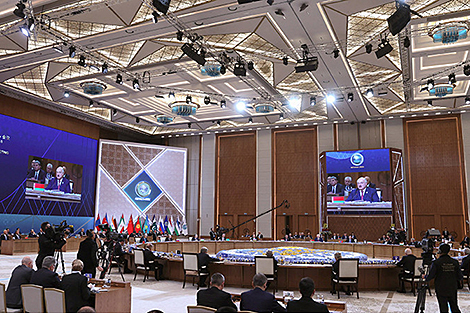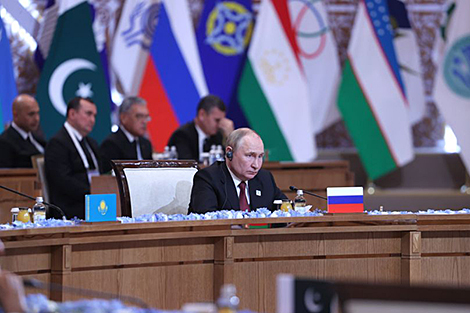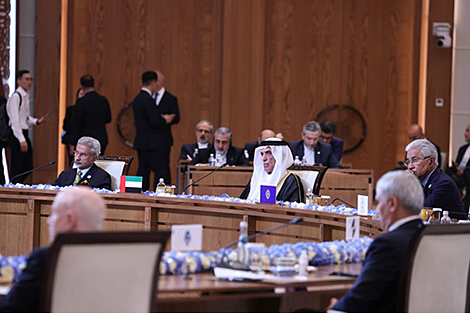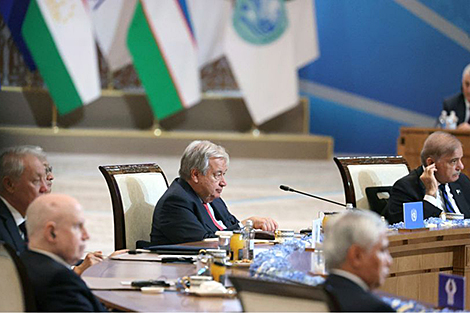News & Events in Belarus
Lukashenko lays out his vision for Greater Eurasia at SCO summit

ASTANA, 4 July (BelTA) – Belarusian President Aleksandr Lukashenko laid out his vision for Greater Eurasia at the SCO+ meeting in Astana on 4 July, BelTA has learned.
“I strongly believe that our unity and cohesion will be the best response to challenges in global politics. To do this, we must join forces in the organization’s area of responsibility. For this, we need to create Greater Eurasia,” the Belarusian leader said. He outlined several steps in this direction.
Adopting the Eurasian Charter
The head of state suggested developing a concept for the Eurasian Charter for Diversity and Multipolarity in the 21st Century. The idea of the charter was put forward at the international conference held in Minsk in October last year.
The head of state remarked that this conference in Minsk had already become an annual event focusing on regional security. “Moreover, we see it as a kind of Eurasian alternative to the transatlantic Munich Conference,” he noted. “Invitations to attend the Minsk conference, which is due this autumn, have already been sent to top officials of your ministries of foreign affairs. I would very much like representatives of your countries to participate in discussions on the charter. We believe it should be passed at the level of heads of state.”

Aleksandr Lukashenko seized the occasion to thank President of Russia Vladimir Putin for his recent words in support of this initiative.
Aligning integration processes
The president urged to give a bigger priority to various integration processes on the Eurasian continent.
In this regard, he called to waste no time and take action fast. “Today people in the world are confused and in the dark. The UN secretary-general has just said that the world should be bracing for more conflicts. People need direction and certainty. The SCO can do this. Yet, this must be done quickly, because time is not on our side. Today’s situation is different from what we had after the Second World War and the Cold War. We are pressed for time, thus we need to act now. If we do this, we will be ahead of the curve and the entire global community will thank us,” the Belarusian leader remarked.

He highlighted active integration in the post-Soviet space within the framework of the Union State, the Eurasian Economic Union, the Collective Security Treaty Organization, and the Commonwealth of Independent States. Other Eurasian associations are gaining momentum, too, including ASEAN, the Organization of Islamic Cooperation, and the Arab League. Strategic infrastructure projects are being implemented to make the continent more interconnected, primarily China’s Belt and Road Initiative and Russia’s Northern Sea Route project. “It is necessary to find points of convergence of all these processes and reconcile the interests of all players,” said Aleksandr Lukashenko.
Reducing dependence on the U.S. dollar
Aleksandr Lukashenko suggested stepping up practical interaction across the entire agenda of the Shanghai Cooperation Organization. He suggested starting with finances.
“As a matter of priority Belarus suggests developing a mechanism for bilateral payments using national currencies and setting up a joint financial institution of the Shanghai Cooperation Organization,” he stated.

The president noted that the Shanghai Cooperation Organization countries account for a considerable share of the world’s population and GDP. “Only our organization has two most powerful countries in its ranks – China and the Russian Federation. And we still have this awe for the U.S. dollar. Well, let’s finally take action to wean ourselves off the dollar. And you will see that those who have weaponized this currency will come to understand that things can no longer go on like this. We see this but we don’t take action. People are waiting,” the Belarusian leader noted.
Making digital technology more accessible
Another proposal concerns closer cooperation in digital technologies that are becoming part and parcel of our life. “Those digital technologies that benefit people and the economy, not the artificial intelligence that we are anxiously awaiting. Everyone should be able to benefit from technological progress, not just Western countries and transnational corporations,” the president said.

Contributing to the common cause of the SCO countries
Aleksandr Lukashenko assured that Belarus is ready to make whatever contribution it can to the common efforts of the SCO member countries in such areas as industry, trade, science, culture, and education.
The same applies to food security and agriculture, which the president specifically focused on. “People in the world are getting poorer, the hunger crisis is becoming more widespread,” he noted.
The president believes it would be a great idea to set up an AgroSCO exposition at Belarus’ largest agricultural exhibition Belagro. “Over many years of its history, this expo has earned a great reputation among the expert community. We will be glad to see all the countries of the SCO family in Minsk, as well as the presentation of the SCO Demonstration Base for Agricultural Technology Exchange and Training,” the president said.








 print version
print version make home page
make home page add to bookmarks
add to bookmarks

